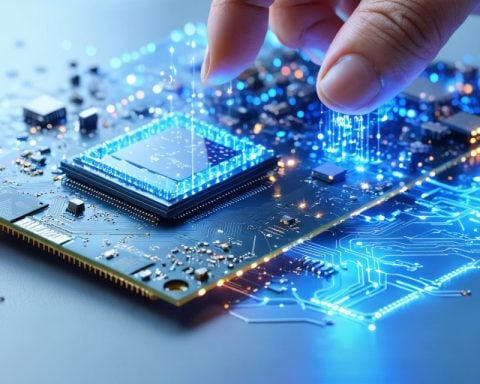The U.S. Department of Commerce has raised concerns about Nvidia’s (NVDA) tech products being illicitly transported into China. Recent reports revealed that over the last year, Nvidia’s cutting-edge products found their way into the Chinese market through unauthorized channels.
In response, the Department of Commerce turned to major tech distributors, including Super Micro Computer (SMCI) and Dell Technologies (DELL). The agency has requested these companies to conduct random audits of their customer networks in Southeast Asia. This move aims to plug potential gaps in the supply chain that might have facilitated the illegal flow of technology into China.
The discreet investigation highlights the ongoing tension between global tech giants and regulatory bodies, especially concerning the sensitive nature of tech exports. The infiltration of these products into the Chinese market could have significant implications for international trade and intellectual property rights.
Stemming the tide of unauthorized tech transfer remains a critical concern, as companies like Nvidia represent the pinnacle of American innovation. Ensuring that technological advancements are appropriately secured and distributed is imperative not only for corporate interests but also for maintaining a level playing field in the global market.
As the situation unfolds, stakeholders in the tech industry will be closely watching how the involved parties address these allegations and reinforce their distribution strategies.
Nvidia’s Tech Transfer Controversy: Implications and Solutions
The recently raised concerns by the U.S. Department of Commerce regarding Nvidia’s (NVDA) high-tech products being illicitly transported into China have sparked a significant debate in the tech industry. This development sheds light on several critical aspects of technology management, supply chain integrity, and international trade compliance.
Implications of Unauthorized Tech Transfers
Unauthorized transfers of advanced technology, like those allegedly involving Nvidia, have far-reaching implications. These include the potential for compromising national security, undermining U.S. economic interests, and eroding competitive advantages in cutting-edge technologies. The situation underscores the delicate balance between innovation and regulation, as well as the need for enforceable trade policies.
Measures to Secure Supply Chains
The response from the Department of Commerce, involving major tech distributors such as Super Micro Computer (SMCI) and Dell Technologies (DELL), is a preventive step to address these challenges. By requesting audits of customer networks and supply chains in Southeast Asia, the government aims to identify and close loopholes that facilitate unauthorized exports. This strategy highlights an emerging trend of increased scrutiny and stricter compliance measures in international tech exports.
Innovations in Supply Chain Security
To combat illicit tech transfers, companies are expected to adopt advanced solutions such as blockchain technology for transparent tracking, enhanced network security protocols, and artificial intelligence (AI) for monitoring and detecting irregular activities. By doing so, businesses are likely to see improvements in their ability to enforce trade compliance and protect intellectual property.
Industry Reactions and Predictions
Stakeholders in the tech industry are watching closely as involved parties address these serious allegations. How Nvidia, along with its partners, will strengthen its distribution strategies and enhance its tech safeguards will serve as a blueprint for other companies facing similar challenges. Industry experts predict a surge in innovation related to supply chain security measures, focusing on predictive analytics and machine learning.
Balancing Technological Advancements and Compliance
As the narrative unfolds, the importance of balancing technological advancement with robust security and compliance becomes more evident. Ensuring that companies like Nvidia contribute positively to global tech advancements while adhering to international laws is crucial for maintaining their role as leaders in the industry.
For more insights into the challenges faced by tech giants like Nvidia, visit the U.S. Department of Commerce main website.



















